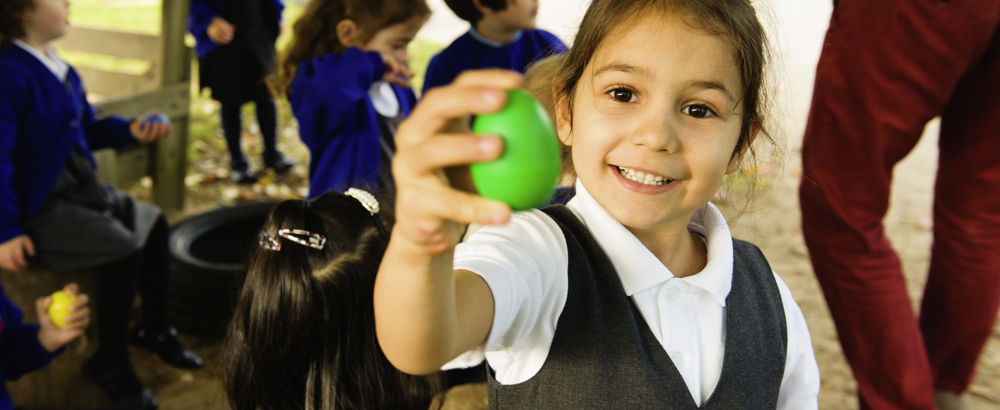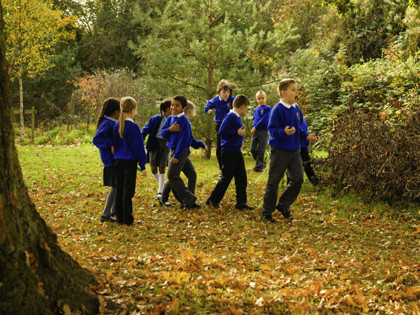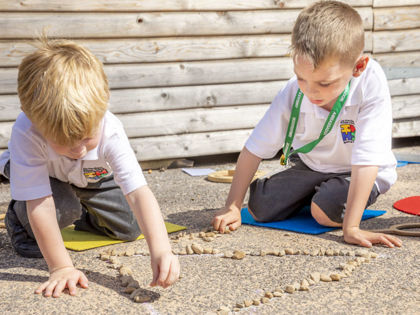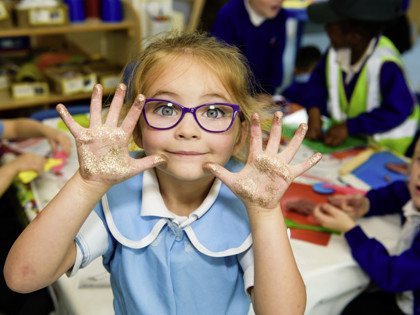Modern Foreign Languages
BUILDING FUTURES CURRICULUM INTENT
At De Havilland Primary School, we recognise the importance of learning a foreign language; we know that many of our children can already speak two languages and how this offers unique experiences for them. Children, who want to explore different parts of the world now and in the future, can learn about diverse cultures, places, and lifestyle. By knowing how to acquire the skills of learning a new language this can offer life changing experiences.
Learning a foreign language can also open many career paths, for example in leisure and tourism, transportation, worldwide trade, education and linguistics. French is our chosen language because 29 countries have French as their national language and 220 million people speak French around the world.
Coverage of skills and knowledge centred on The National Curriculum, Language Angels, and enhanced for our children by De Havilland Primary School Academy. Evidence of this subject can be found by speaking to our wonderful children, looking in their project learning books and seeing school and classroom displays.
PROGRESSION OF KNOWLEDGE AND SKILLS
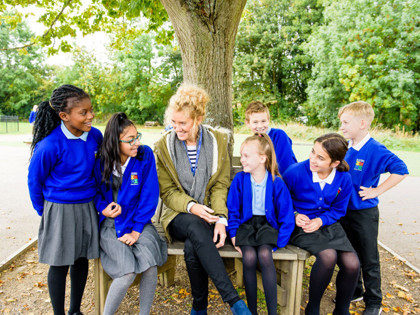
LISTENING
|
Nursery |
I will be able to listen to others speaking in different languages in my class or at home |
| Reception |
I will be able to listen to others speaking in different languages in my class or at home. I will be able to understand when somebody says hello in French. |
| Year 1 |
Appreciate and actively participate in traditional short stories & fairy tales. |
| Year 2 |
Appreciate short stories & fairy tales and start to understand some of the familiar words in what we hear. |
| Year 3 |
Listen to and enjoy short stories, nursery rhymes & songs. Recognise familiar words and short phrases covered in the units taught. |
| Year 4 |
Learn to listen to longer passages and understand more of what we hear by picking out key words and phrases covered in current and previous units. |
| Year 5 |
Listen more attentively and for longer. Understand more of what we hear even when some of the language may be unfamiliar by using the decoding skills we have developed. |
| Year 6 |
Listen to longer text and more authentic foreign language material. Learn to pick out cognates and familiar words and learn to 'gist listen' even when hearing language that has not been taught or covered. |
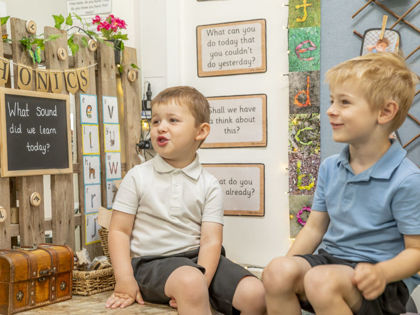
SPEAKING
|
Nursery |
I will be able to say some words in different languages relating to my learning e.g. happy new year in Chinese |
| Reception |
I will be able to answer the register in a variety of different languages I will be able to sing songs in other languages |
| Year 1 | Learn to repeat and reproduce the language I hear with accurate pronunciation. |
| Year 2 | Learn to articulate key words introduced in the lesson and understand their meaning. |
| Year 3 | Communicate with others using simple words and short phrases covered in the units. |
| Year 4 | Communicate with others with improved confidence and accuracy. Learn to ask and answer questions based on the language covered in the units and incorporate a negative reply if and when required. |
| Year 5 |
Communicate on a wider range of topics and themes. Remember and recall a range of vocabulary with increased knowledge, confidence and spontaneity. |
| Year 6 | Learn to recall previously learnt language and recycle / incorporate it with new language with increased speed and spontaneity. Engage in short conversations on familiar topics, responding with opinions and justifications where appropriate. |
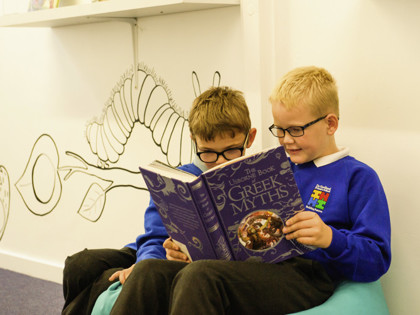
READING
|
Nursery |
I will know that different languages look different when they are printed (see bilingual texts) |
| Reception |
I will know that different languages look different when they are printed (see bilingual texts) |
| Year 1 | Be able to identify written versions of the words I hear. |
| Year 2 | Being able to identify the written version of a wider range of the words I hear. |
| Year 3 | Read familiar words and short phrases accurately by applying knowledge from 'Phonics Lesson 1'. Understand the meaning in English of short words I read in the foreign language. |
| Year 4 | Read aloud short pieces of text applying knowledge learnt from 'Phonics Lessons 1 & 2'. Understand most of what we read in the foreign language when it is based on familiar language. |
| Year 5 | Understand longer passages in the foreign language and start to decode meaning of unknown words using cognates and context. Increase our knowledge of phonemes and letter strings using knowledge learnt from 'Phonics Lessons 1 to 3'. |
| Year 6 | Be able to tackle unknown language with increased accuracy by applying knowledge learnt from 'Phonics Lessons 1 to 4' including awareness of accents, silent letters etc. Decode unknown language using bilingual dictionaries. |
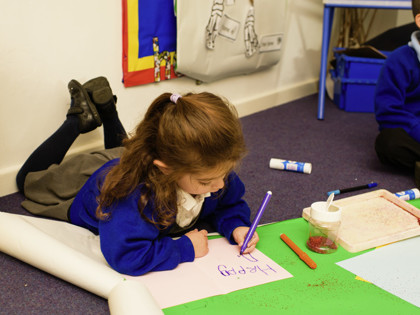
WRITING
|
Nursery |
I will see different prints in my learning environment and have opportunities to mark make. |
| Reception |
I will see different prints in my learning environment and have opportunities to mark make. |
| Year 1 | Consolidate letter formation skills by copying words in the foreign language from a model. |
| Year 2 | Start to reproduce nouns and determiners/articles from a model. |
| Year 3 | Write familiar words & short phrases using a model or vocabulary list. EG: 'I play the piano'. 'I like apples'. |
| Year 4 | Write some short phrases based on familiar topics and begin to use connectives/conjunctions and the negative form where appropriate. EG: My name, where I live and my age. |
| Year 5 | Write a paragraph using familiar language incorporating connectives/conjunctions, a negative response and adjectival agreement where required. Learn to manipulate the language and be able to substitute words for suitable alternatives. EG: My name, my age, where I live, a pet I have, a pet I don't have and my pet's name. |
| Year 6 | Write a piece of text using language from a variety of units covered and learn to adapt any models provided to show solid understanding of any grammar covered. Also start to incorporate conjugated verbs and learn to be comfortable using connectives/conjunctions, adjectives and possessive adjectives. EG: A presentation or description of a typical school day including subjects, time and opinions |
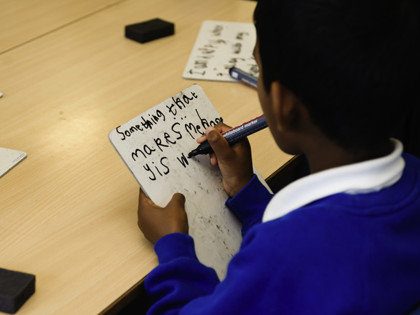
GRAMMAR
| Year 1 | Start to understand that foreign languages can have different structures to English. |
| Year 2 | Start to understand that foreign languages can have different structures to English. EG: Many nouns have a determiner/article in foreign languages which we don't have in English. |
| Year 3 | Start to understand the concept of noun gender and the use of articles. Use the first person singular version of high frequency verbs. EG: 'I like…' 'I play...' 'I am called' |
| Year 4 | Better understand the concept of gender and which articles to use for meaning (EG: 'the', 'a' or 'some'). Introduce simple adjectival agreement (EG: adjectival agreement when describing nationality), the negative form and possessive adjectives. EG: 'In my pencil case I have…' or 'In my pencil case I do not have...' |
| Year 5 | Revision of gender and nouns and learn to use and recognise the terminology of articles (EG: definite, indefinite and partitive). Understand better the rules of adjectival agreement and possessive adjectives. Start to explore full verb conjugation (EG: 'I wear...', 'he/she wears...' and also be able to describe clothes in terms of colour EG: 'My blue coat'. |
| Year 6 | Consolidate our understanding of gender and nouns, use of the negative, adjectival agreement and possessive adjectives (EG: which subjects I like at school and also which subjects I do not like). Become familiar with a wider range of connectives/conjunctions and more confident with full verb conjugation ‐ both regular and irregular. EG: 'to go', 'to do', 'to have' and 'to be'. |
CURRICULUM ENHANCEMENT OPPORTUNITIES
Sharing Assemblies – Opportunity for children to perform to an audience
Bastille Day – French focused day with role play opportunities, cooking and food tasting, cross key stage learning, guests to practice speaking to and games
Spanish Themed Day – Focusing on role play opportunities, cooking and food tasting, guests to practice speaking to, cross curricular learning and games
Local Secondary school (Bishops)- Community link with languages department (Secondary children come and teach the younger children)
Links with World Cup, Olympics and other large sporting events
Problem solving in a different language
World Book Week - Story telling
Visitors to the school
Music/musicians and bands
SOCIAL, EMOTIONAL AND MENTAL HEALTH
|
Nursery |
I will know what language/languages I can speak. I will know that others might speak different languages. I will be able to ask my grownups for help. |
| Reception |
I will know what language/languages I can speak I will know that others might speak different languages. I will know people I can talk to if I need help. I will know some simple signs to help me communicate if I am finding it difficult. |
| Year 1 and 2 | I will know people I can talk to if I need help I will know there are communal languages that everybody can use to help people or myself to understand (e.g. sign/non verbal communication) |
| Year 3 | I will know how to communicate with someone effectively if I am finding things tricky. I will be able to complete a network of support hand with people and things that can help me. I will recognise uh oh feelings and know who can help me. |
| Year 4 | I will know how to communicate with someone effectively if I am finding things tricky. I will be able to complete a network of support hand with people and things that can help me. I will recognise uh oh feelings and know how to help myself. |
| Year 5 and 6 | I will be able to offer my peers strategies if they are finding it difficult to communicate. I will recognise uh oh feelings and know how to help myself. I will be able to speak in a different language with confidence (knowing its ok to make mistakes) |
LEARNING BEHAVIOURS
|
Nursery and Reception |
I will be able to notice when things are the same/differentI will be able to notice patterns. |
| Year 1 |
I will be able to notice when things are the same/different. I will be able to notice patterns. I will be able to notice when |
| Year 2 | I will be able to notice when things are the same/different. I will be able to notice patterns. I will be able to notice when things are new. I will be able to notice change in others behaviour. I will be able to keep trying when things are tricky. I will be able to see connections in events and learning. I will understand how different aspect of learning can link together. I will be able to learn something new by watching others. |
| Year 3 | I will be able to notice patterns. I will be able to notice change in others behaviour. I will be able to notice when things out the ordinary happen. I will know when I need to persevere to achieve my best. I will understand that learning can be a slow and uncertain process. I will understand how different aspects of learning can link together. I will be able to build up patterns that help me to notice and make links. I will be able to learn by adopting others strategies and methods. |
| Year 4 | I will be able to notice patterns. I will be able to notice when things out the ordinary happen. I will be able to notice subtle difference and similarities. I will know when I need to persevere to achieve my best. I will understand that learning can be a slow and uncertain process. I will understand how different aspects of learning can link together. I will be able to build up patterns that help me to notice and make links. I will be able to learn by adopting other strategies and methods. |
| Year 5 and 6 | I will be able to notice patterns. I will understand when and how to use what I have noticed and when to ignore it. I will be able to notice subtle difference and similarities. I will know how to explore details in experiences. I will understand how to use my perseverance skills to achieve my best. I will understand that perseverance is not doing the same over and over with no change in outcome. I will know how to look at learning from different perspectives. I will show an understanding of how everything can be related in a web of connections. I will be able to weave my own webs of understanding using my own experiences. I will be able to change my methods, habits or values based on what I observe from others. |
CURRICULUM IMPLEMENTATION
How is French delivered across each year group?
Year Three:
In Year Three, children begin their journey of learning french at De Havilland. They are introduced to the reasons why learning French is important to them and the opportunities it provides both for their education and future life options; this is done through the unit I Am Learning French. Five further units are then taught across the year, including: Colours and Numbers, Animals, Transport, Little Red
Riding Hood and I can…. Across the teaching of all units, children enjoy listening and participating in nursery rhymes and songs to support them developing familiarity with the French language.
There is a strong focus on the children reading, speaking and listening to both adults and each other, as well as writing familiar words and short phrases as part of their learning.
Year Four:
Children begin the year revisiting core vocabulary taught in Year Three before continuing their French learning journey through the units: Christmas, Musical Instruments, Fruits and Vegetables, The Seasons and Under the Sea. The children build on their vocabulary learning from Year Three and begin to communicate with adults and each other with improved confidence and accuracy. The children also begin to write several short phrases related to a particular topic, using conjunctions where appropriate. They also start to understand the concept of noun gender.
Year Five:
Children communicate on a wider range of topics and themes. The units taught across the year include: Presenting Myself, Family, The Classroom, At the Cafe and Goldilocks. Across the teaching of these units, the children are exposed to longer passages of texts written in French, decoding new, unfamiliar vocabulary using cognates and context. The strong focus on reading, speaking and listening continues whilst in writing, the children are provided with further opportunities to write full sentences and move towards using these to construct short paragraphs.
Year Six:
Children are exposed to more authentic French language material through the units: Clothes, Do you have a pet?, The Weather, In the Home and The Olympics. Across these units, the children listen to and engage in increasingly more complex conversations and write at further length about the topics they have covered. They also consolidate their understanding of gender and nouns.
What are the key concepts taught?
In Year 3 - 4, the children learn to:
- Name and locate France and French speaking countries.
- Ask and say how they feel.
- Ask and say their name.
- Count from 1-10, pronouncing and spelling each number.
- Pronounce and spell ten colours.
- Identify the French name for ten animals nouns.
- Spell the names of different animals and identify the correct article for each.
- Identify the French word for different modes of transport, including: car, plane,
- boat, bus, motorbike, train, lorry.
- Name different parts of the body in French.
- Describe up to five different activities they can do, using the French verb
- pouvoir in the form of je peux (I can).
- Name up to ten fruits and vegetables in singular form.
- Change fruit and vegetable nouns from the singular form to the plural form.
- Share a positive and negative opinions using ‘J’aime…’ (I like) and ‘Je n’aime
- pas….’ (I do not like).
- Know the name and article used for up to ten musical instruments.
- Use the phrase je joue… (I play) when speaking and writing about instruments.
- Name up to ten shapes and draw shapes when their features are described.
- Write short sentences in french which describe the different seasons.
- Say their favourite season and justify their answer.
- Describe some of what can be seen under the sea.
- Listen to stories in French and identify the meaning of key vocabulary,
- supported with picture prompts.
In Year 5-6, the children learn to:
- Revisit saying their name and asking somebody else their name.
- Ask someone where they live.
- Introduce themselves in French, stating their nationality, where they live and describe things they like.
- Say (with accurate pronunciation) and remember the nouns and the appropriate definite article for their family members in French.
- Ask and answer the question regarding if they have any brothers or sisters and understand they if they are an only child, their answer will vary depending on whether they are a boy or a girl.
- Introduce other family members by saying what they are called.
- Count to 100 in French to enable them to say how old their family members are.
- Name up to twelve common items of classroom equipment.
- Apply the concept of j’ai and je n’ai pas de to say what they do and do not have in their pencil case.
- Familiarise themselves with a range of food and drink nouns with the article.
- Order something to eat and drink in a French cafe.
- Undertake a class survey asking what other children have for breakfast.
- Listen to and retell a well-known fairytale in French.
- Explore a range of clothing with a strong focus on using the correct gender/article for each item.
- Revise the article and nouns for eight common pets and understand the meaning of the phrase ‘j’ai’ (I have) and the connective ‘et’ (and).
- Explore up to nine key weather phrases and use these to construct weather descriptions.
- Identify information about major French cities and learn compass points in French.
- Describe what is in their home.
- Change the positive phrase ‘chez moi il y a...’ (in my home there is/are...) into the opposite / negative phrase ‘chez moi il n'y a pas de...’ (in my home there is not.../there are no...).
- Recognise the French words for ten Olympic sports and correctly use the verb ‘faire’ (to do) in respect of expressing if someone does or does not do a particular sport.
How does the learning prepare children for the opportunities, responsibilities and experiences of later life?
The emphasis on speaking and listening gives children opportunities to speak in front of others and develops their confidence and self-esteem in doing so. At De Havilland, we believe that learning another language supports the inclusive nature of our school and promotes both tolerance and further interest in other countries, cultures and languages. The scheme of work we follow explores areas of life which are of interest to the children and introduces them to vocabulary which could be utilised should they choose to visit a French speaking country or engage in conversation with a French speaking person.
What are the planned opportunities for developing English, Mathematics, Oracy and SMSC?
Children's English skills will be developed across the key stage by providing them with ample opportunities to improve their speaking and listening. Phonics skills are also utilised when decoding new and unfamiliar vocabulary. Additionally, various aspects of grammar which are taught (for example, the use of articles and conjunctions) support children with their sentence construction in English, both in
terms of speaking and writing.
Mathematical skills are developed whilst learning about various topics, including the Year Three unit ‘Colours and Numbers’ and the Year Four unit ‘Shape’. Learning French supports social development by encouraging a collaborative approach to learning, with children regularly conversing in the target language. It supports moral development by encouraging children to look, discuss and evaluate a range of social and moral issues found in other cultures. French supports spiritual development by exploring new language and vocabulary. It also supports the cultural development of our children by exposing them to a foreign language and culture. It helps promote Internationalism and their role within the world.
What are the planned opportunities for personalisation, including for SEN, the more able and Pupil Premium children?
Ideas for personalisation are built into class and home learning tasks to consolidate understanding of key concepts.
Whole-school principles of differentiation for those more able children are followed i.e. language differentiated according to ability, level of challenge increased for those more able children. Our more able children also have access to an English-French dictionary during lessons to encourage further independence in their learning.
Whole-school principles of differentiation for those children with SEN i.e. – scaffolded learning, use of images, targeted adult support where required. Whole-school principles of differentiation for those PP children.
What is done in French to support the social, emotional and mental health needs of the children?
Many of the topics taught involve the children speaking and writing about things they like and enjoy. The emphasis on speaking and listening means they will also receive further opportunities to work with their peers and converse with children they may not ordinarily speak with, potentially widening their social circles.

